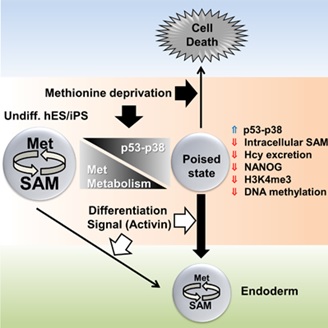
Nobuaki Shiraki, Yasuko Shiraki, Tomonori Tsuyama, Fumiaki Obata, Masayuki Miura, Genta Nagae, Hiroyuki Aburatani, Kazuhiko Kuma, Fumio Endo, Shoen Kume, Methionine Metabolism Regulates Maintenance and Differentiation of Human Pluripotent Stem Cells. Cell Metabolism, doi: 10.1016/j.cmet.2014.03.017
Mouse embryonic stem (ES) cells and induced pluripotent stem (iPS) cells are in a high-flux metabolic state, with a high dependence on threonine catabolism. However, little is known regarding amino acid metabolism in human ES/iPS cells. We show that human ES/iPS cells require high amounts of methionine (Met) and express high levels of enzymes involved in Met metabolism. Met deprivation results in a rapid decrease in intracellular S-adenosyl-methionine (SAM), triggering the activation of p53-p38 signaling, reducing NANOG expression, and poising human iPS/ES cells for differentiation, follow by potentiated differentiation into all three germ layers. However, when exposed to prolonged Met deprivation, the cells undergo apoptosis. We also show that human ES/iPS cells have regulatory systems to maintain constant intracellular Met and SAM levels. Our findings show that SAM is a key regulator for maintaining undifferentiated pluripotent stem cells and regulating their differentiation.

Figure the effect of methionine on human ES/iPS cells
Decrease in [SAM]i by methionine deprivation led to p53-p38 signaling activation. Short methionine deprivation poises human ES/iPS cells for differentiation. Prolonged methionine deprivation induces apoptosis of pluripotent stem cells.